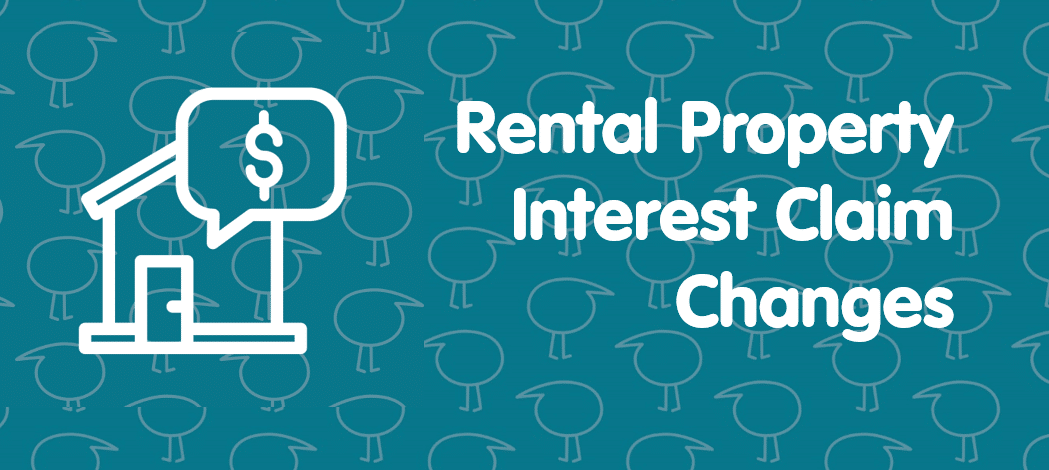
UPDATE 10/3/2024: There has been an announcement about changes to interest deductibility, bringing forward and increasing the rate of deductibility.
- Financial year ending 31 March 2024 – no changes to interest deductibility rules – they will remain at 50% as was previously set in place by the prior government (or continuation of none if they bought after 27 March 2021)
- Financial year ending 31 March 2025 – 80% of interest on mortgages will be claimable
- Financial year ending 31 March 2026 – 100% of interest on mortgages will be claimable
___________________________________________
Most Residential Rental Property owners will be affected by the changes the government announced earlier in March 2021, removing the ability to claim interest against the income they earn from their residential rental property.
Inland Revenue released draft legislation in late September 2021 covering the changes to interest deductibility, and it is only expected to be passed into law in early 2022, although the changes applied to purchases from March 2021.
We’ve put together a brief summary of the changes to help you understand how this will affect you.
Existing Properties
The changes apply from 1 October 2021 for existing properties purchased on or after 27 March 2021.
Properties purchased before 27 March 2021, will have interest deductibility phased out over the period between 1 October 2021 and 31 March 2025 as detailed below:
| Date interest incurred | Percentage of interest expense that can be claimed |
| 1 April 2020 to 31 March 2021 | 100% |
| 1 April 2021 to 30 September 2021 | 100% |
| 1 October 2021 to 31 March 2022 | 75% |
| 1 April 2022 to 31 March 2023 | 75% |
| 1 April 2023 to 31 March 2024 | 50% |
* See update above
For tax purposes, a property is generally acquired on the date a binding sale and purchase agreement is entered into.
Inland Revenue also state that generally, any residential investment property in New Zealand that is suitable for people to live in long term will be affected whether it is being used for providing short or long-term accommodation.
New Builds
Properties that receive a code of compliance on or after 27 March 2020 will be eligible to deduct interest expenses for up to 20 years. This applies to the initial purchaser/s & any subsequent owner within the 20-year period. The 20-year period will not reset when the property is sold. The exemption will expire 20 years after a new build receives its code of compliance certificate (CCC) or when it ceases to be on the land (e.g. demolished or removed).
New builds will also have a shortened bright-line test period of 5-years instead of 10-years.
What is a new build?
A new build will generally be defined as a self-contained residence that receives a CCC confirming the residence was added to the land on or after 27 March 2020.
A new build will not have to be made of new material or constructed onsite, so it can include modular and relocated homes.
If you convert an existing dwelling into multiple new dwellings, this can qualify as a new build. So too can converting a commercial building into residential dwellings.
When does the new build exemption begin?
You will be able to apply the exemption and deduct interest from the date you acquire the property (if it already has code of compliance) or from the date your new build receives it’s code of compliance.
Land Business & Property Development
The land business exemption will apply for interest relating to land if you hold that land as part of a developing, subdividing, or land-dealing business, or a business of erecting buildings on land.
Interest relating to remediation work and other expenses from ownership and development of the land will also qualify if this exemption applies.
If you do not qualify for the land business exemption, the development exemption will apply for interest relating to land that you develop, subdivide, or build on to create a new build. You can only deduct interest if existing tax rules allow you to, even if you qualify for the exemption.
The exemption will apply from the time you start developing the land and end when you sell the land or receive a CCC for your new build. Once your new build receives its CCC, the new build exemption will apply instead.
Interest relating to remediation work done to an existing property that is not significant enough to create a new build will not qualify for this exemption.
About Kiwitax – Award winning business improvement, tax and accounting service
Here’s the thing. As a business, rental property owner or start-up, you get a kick out of having your own gig. But chances are dealing with your tax and accounting leaves you cold. Good news! We love it, so hand it over to Kiwitax and we’ll look after it all for you.
Whether you deal with us online, by phone or drop into our Napier office, you’ll find a friendly, professional hardworking team ready to work with you, however you keep track of your financial information and from wherever you do business. And all for a fixed price. It takes just two minutes to get a quote.
Plus if you’re at a loss to know how to improve aspects of your business – from growth planning to cashflow management, even tax debt and so much more – we’re all over that too. Our Business Improvement advisors can help you make a plan and put it into action.
If you liked this article and want to make improvements in your business, with quarterly coaching sessions specifically tailored to support you to identify and achieve your business goals, lets chat!